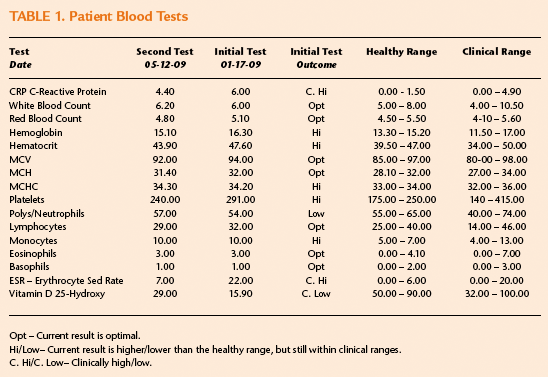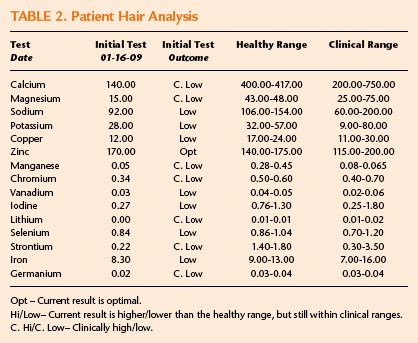It’s a new year and many chiropractors are evaluating what will enhance their respective practices, particularly as it relates to their bottom line. One of the most common questions I get is: “Do I need to be credentialed to bill insurance, and what are the best plans to join?” It’s a loaded question – but one every DC ponders. Whether you're already in-network or pondering whether to join, here's what you need to know.
Treat Rheumatoid Arthritis With More Than an Adjustment
More and more, researchers are finding that every piece of food you put in your mouth; each can of energy drink or soda consumed; the chemical-filled makeup women wear; the pesticides used on crops; and the toxins and metals used in factories can trigger debilitating diseases such as cancer, arthritis, multiple sclerosis, diabetes and even burdensome conditions like psoriasis. But there is good news: If environmental factors are the trigger, reducing our exposure should lessen our risk of developing diseases.
In many cases, however, the err of our ways only appears in hindsight. Walking into an appointment with a new patient at my clinic, the metallic smell of smoked cigarettes hit me as soon as I opened the door. Sitting in the consult room, my 61-year-old patient looked miserable and as we started talking, it was clear to see why.
He had been diagnosed five years prior with what his medical doctor called "radical rheumatoid arthritis" that was very aggressive and crippling, and prescribed methotrexate and Enbrel. He was overweight at 5'9" and 218 lbs, which did not help his already painful joints, had no energy, battled with insomnia, restless legs, muscle cramping/spasms, a lingering phlegm-filled cough and chronic ear infections. A self-proclaimed alcoholic and longtime smoker, he consumed a 12-pack of beer at least three times per week and smoked about 25 cigarettes per day.
Many times a chiropractor would simply nod their head in sympathy and make a generic multivitamin or glucosamine supplement recommendation, but you can offer your patients so much more! In less than four months, this man was off all his medications and felt so good he climbed up on his roof and spent two weeks reshingling his house! So, how can you help your patients achieve results like this? Start with the basics:
Back to Basics
Order a blood panel including complete kidney, liver, thyroid, CBC and lipid panels. Also an ESR, CRP, ferritin, hemoglobin A1C, CK and 25-hydroxy vitamin D. The CBC, ESR and CRP are going to show immune function and inflammation, which directly correlates to the RA. The other tests will alert you to other problems going on in the body or any damage done by RA medications.
Look at a hair analysis to see what toxins are present in the body and what the levels of essential elements look like. Use a chelator like chlorella or EDTA to cleanse the body of toxins like lead and mercury, and supplement low levels of essential elements like calcium and magnesium.
Tell any patient who smokes to stop immediately! As far as environmental factors are concerned, smoking is a big one, shown to double the risk of developing rheumatoid arthritis (RA). Smoking more than 20 cigarettes per day actually quadruples the risk for males.1
Help patients focus their meals on whole foods and organic items. This will limit or altogether eliminate exposure to pesticides and processed or chemically altered foods.
Rheumatoid arthritis is classified as an autoimmune disorder, meaning the body's immune system mistakingly attacks healthy body tissues instead of foreign agents. Specifically, RA causes the immune system to attack synovium, the membrane linings surrounding the joints. This causes inflammation, which thickens the synovium, causing erosion of the cartilage and bone within the joint itself. This rippling effect continues as tendons and ligaments holding the joint together weaken and stretch, leading to loss of joint deformity.
Most medical doctors resort to disease-modifying antirheumatic drugs like methotrexate to try and slow the progression of RA; however, the side effects of these drugs are startling - liver damage, bone marrow suppression and severe lung infections have been reported. Anyone on RA meds is also at greater risk of developing general infections. For example, my patient battled recurring ear infections. That's why it's so important to test broadly and comprehensively; you never know where damage has been done!
Test Results
Table 1 shows some of the main test results directly associated with rheumatoid arthritis. In the first test (July 2009), we see clinically elevated CRP and ESR levels, slightly elevated CBC results and a very low vitamin D level. The low polys and high platelets and monocytes are likely due to an infection, and the low vitamin D level is another sign of the patient's lowered immune system.

In the hair analysis (Table 2), we (surprisingly) saw very few toxic elements. This was especially odd because of his smoking history. We are exposed to toxins daily from the environment as it is, and he was adding extra chemicals and metals daily with his smoking habit. This likely meant he was not capable of purging toxins and they were instead being stored inside his body. Not only do toxins disrupt the healing process, but they also displace many forms of essential elements. His hair analysis revealed more than a dozen low levels of essential elements which are also needed to flush out toxins and boost the immune system. Clearly the patient was nutrient deficient.

Supplementation Strategy
Based on these test results, there were four main target areas for supplementation.
- Reduce inflammation/ease arthritis symptoms: A natural anti-inflammatory containing ginger or tumeric, as well as fish oil, vitamin E and glucosamine with MSM, can help ease arthritis symptoms.
- Improve immunity: Vitamin C, vitamin D, monolaurin and a good multivitamin will help boost immunity.
- Detoxification: Natural chelators like chlorella will help draw out toxins; also encourage the patient to stop smoking and follow an organic diet.
- Boost essential elements: Without the essentials, the body cannot take care of itself and will deteriorate - supplementing all things which appeared low in the hair analysis is in order.
I met with the patient a few months later, after he had completed some follow-up blood work to track his progress. The ESR and CRP had both dropped, the vitamin D had increased and his CBC panel was practically perfect. He was thrilled. He had stopped smoking, was off all medications and felt so good he threw $800 worth of the drug Enbrel in the trash. He had also reduced his caffeine intake and was down to just one beer per week. In short, this patient made great strides toward improving his health and I firmly believe that his future mobility and quality of life will be directly represented by this effort.
Reference
- "Smoking Ups Men's Rheumatoid Arthritis Risk Most." Reuters Health, Dec. 24, 2009.



